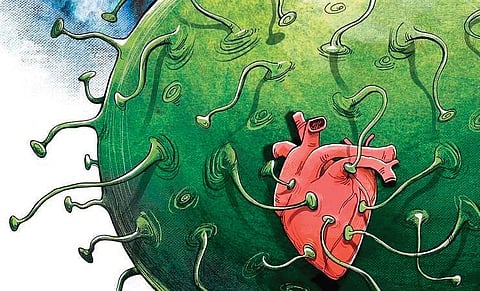

KOCHI: Over the past two years of the pandemic, it has been established without doubt that a Covid infection causes serious and far-reaching consequences to one’s body. Though it is difficult at present to pinpoint specific effects and their repercussions, serious health issues that have developed subsequent to the infection in recovered patients are a major concern. Of late, the increasing cases of sudden cardiac arrest (SCA) in Covid-recovered patients -- even among youngsters -- have shocked people.
Studies conducted across the globe have revealed that Covid infection places people with heart ailments at severe risk of developing complications. However, a series of unanswered questions arise, when SCAs occur in healthy Covid-recovered patients. According to experts, there seems to be a connection with SCA cases, as Covid apparently makes blood prone to clotting.
“If we need to link sudden cardiac arrests and Covid, there should be enough evidence to support this. It seems apparent that the two are linked, when studying patients who had Covid infection and those who didn’t. While we look at the numbers alone, some people who recovered from Covid infection are seen getting sudden heart attacks. Though there is a connection, we cannot predict who all with Covid will get a heart attack, because the infection is so widespread. When we look at a large number of people, those who recovered from Covid definitely seem to have a slightly higher incidence of heart disease,” said Dr. K K Pradeep, a cardiothoracic surgeon based in Kochi.
The rising incidents of cardiac arrest among healthy Covid-recovered patients have created fear among them. “Minor blocks in arteries start to form once over the age of 20. Only when blocks develop to over 70% do they create evident problems, and one seeks medical help. Not everybody with a block gets a heart attack. It happens only when there is a clot in the arteries, on top of the blocks. It is the clots that are responsible for heart attacks. Covid seems to make blood more prone to clotting, and we cannot possibly predict who all are likely to develop a clot and have attacks,” said Dr. Pradeep.
Meanwhile, relying on anti-clot medicines is not a viable solution for those who do not fall under patient categories with known risk factors, such as heart ailments, diabetes and hypertension. “It is not possible to give anti-clot medicines to all those who have had Covid. Also, certain blood tests, like the D-dimer tests, are conducted on those who have had the infection to check whether the inflammation is substantial or not. If identified in the tests that there is a risk for the patient, they could be placed on blood thinners. After three-four weeks of the infection, if the D-dimer levels are not coming down and remain elevated, it is a sign that there is an ongoing inflammation in the body and the blood is prone to clotting,” said Dr. P Madhukumar, a cardiologist based in Kozhikode.
Though youngsters are getting cardiac arrest while doing workouts, experts point out that there is no proof linking it to exercises. “Even a person having 20-30% block in the heart can have clots. Youngsters developing any discomfort after recovering from Covid should not wait till later; they should seek medical help. There is no proof that due to exercise, one person may develop a heart attack even after Covid,” said a cardiologist at Kottayam Medical College Hospital.